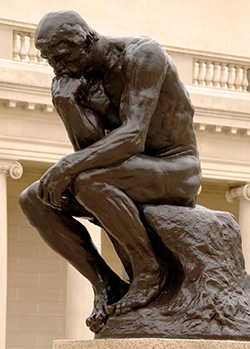Amy Cuddy’s “Fake It Till You Become It”
The real story of this TED presentation by Amy Cuddy isn’t about “faking it till you become it” nor about the benefits of power postures. What people find inspiring about this video is her courage. There are billions of people who fake it till they make it (they don’t need to watch this video), but most of them are not aware of the fact that they are faking it. There is nothing inspiring about them because they don’t need any courage to do what they do. Being self-critical, in this sense, is a handicap. What’s inspiring is the courage to overcome this handicap while still remaining self-critical. Cuddy’s practical solutions in this video are secondary. “Fake it till you make it” or those power postures are not necessarily effective leadership qualities if they are not accompanied by a healthy dose of self-criticism.
 I think we all tend to make our bodies shrink when we have to think hard (like in Rodin’s “The Thinker”). It’s hard to think deeply while you are in one of those “power postures”; they encourage you NOT to think so hard, to step back and breathe. In other words, if you want to be powerful, don’t think so much. But if you are in a situation where you have to think hard and deep, power postures are counter-productive. You need to shrink yourself.
I think we all tend to make our bodies shrink when we have to think hard (like in Rodin’s “The Thinker”). It’s hard to think deeply while you are in one of those “power postures”; they encourage you NOT to think so hard, to step back and breathe. In other words, if you want to be powerful, don’t think so much. But if you are in a situation where you have to think hard and deep, power postures are counter-productive. You need to shrink yourself.
So, my theory is that these postures are not necessarily correlated to power but are to thinking. Deep thinking is a solitary activity, and thinking (for most people) increases stress. “Power” is what you derive from social activities, so you need a posture that encourages social activities (more intuitive activities). “Power” is just one of the side effects of the latter.


